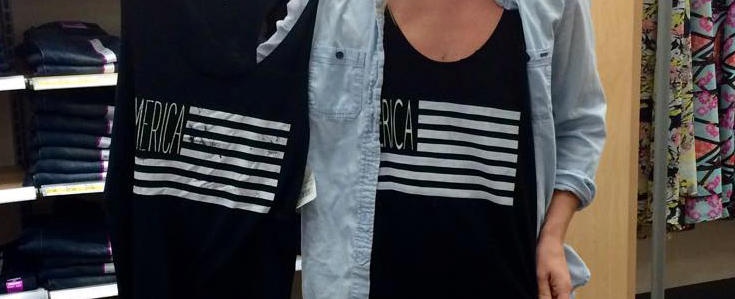3 Count: #Merican Idol

Have any suggestions for the 3 Count? Let me know via Twitter @plagiarismtoday.
1: Oregon Woman Accuse Target of Stealing T-Shirt Design
First off today, ABC News is reporting that Melissa Lay, a clothing designer on Etsy, claims to have found a t-shirt nearly identical to one of her designs in target, prompting a viral campaign against the company and its partners.
According to Lay, a friend alerted her that target was selling a t-shirt design very close to her #Merica shirt, which is a white-on-black design that features the expression along with stripes to simulate and American flag. She has found success selling the shirts on Easy for $25 a piece but Target was selling theirs for about half.
Target has said that they are aware of the issue and are reaching out to Lay to resolve it. However, in the meantime, Lay’s original post featuring her hold Target’s shirt next to her own has been widely shared on Facebook, Twitter and elsewhere.
2: Harvard Files Copyright Infringement Lawsuit Over Online Study Material
Next up today, Mary Moore at the Boston Business Journal reports that Harvard University has filed a copyright lawsuit against 20 “John Doe” defendants that operate various sites that claim to help students taking the Harvard Business School’s online course pass the final exam.
According to the lawsuit, the sites, which have names such as Exam Certify and Test Insiders, is distributing copies a final exam created by the school for its Credential of Readiness (CORe) program. The CORe program is an 8-12 week program that teaches business fundamentals.
The lawsuit extends to test preparation materials and other parts of the CORe program that are created and owned by Harvard. The lawsuit says that the defendants have attempted to mask their identities but once they are unveiled they will be named in the lawsuit.
3: Producers’ Coalition Says Copyright Alert System Has Failed to Stop Piracy
Finally today, Ted Johnson at Variety reports that the Internet Security Task Force, a coalition of smaller movie studios, is claiming that the Copyright Alert System (CAS) in the United States is ineffective and that just 0.3% of all notices they sent through it reached the suspected infringing customer.
The CAS was established in 2013 as a cooperative effort between copyright holders and ISPs. It created a “six strikes” regime by which suspected infringers would be notified when their accounts were used for infringing activity before the ISP would take punitive measures. Those measures did not include account deactivation but could include suspensions and reduced bandwidth.
However, according to the Internet Security Task Force, the system has been ineffective at reducing piracy. On ISPs that don’t participate in the system, including Charter Communications and Cox Communications, the notices were forwarded reliably and there was a 25% reduction in piracy. However, for ISPs participating in the program, there was an increase in piracy after notices were sent out.
Suggestions
That’s it for the three count today. We will be back tomorrow with three more copyright links. If you have a link that you want to suggest a link for the column or have any proposals to make it better. Feel free to leave a comment or send me an email. I hope to hear from you.
The 3 Count Logo was created by Justin Goff and is licensed under a Creative Commons Attribution License.
Want to Reuse or Republish this Content?
If you want to feature this article in your site, classroom or elsewhere, just let us know! We usually grant permission within 24 hours.
